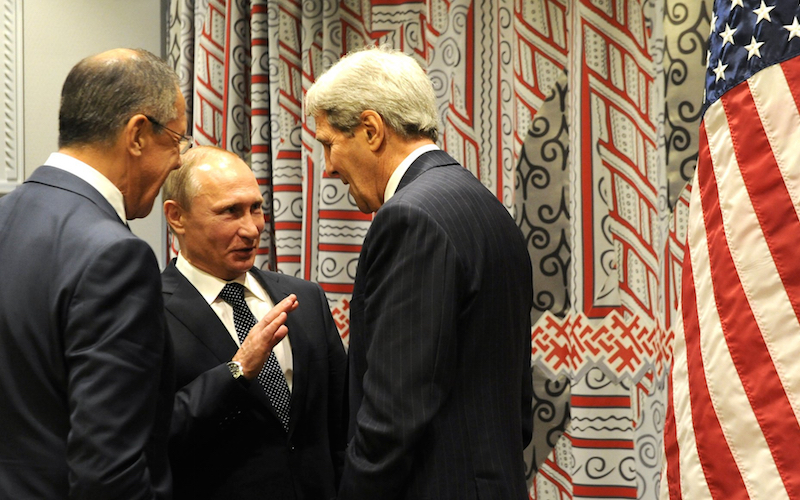
Is Ukraine Being Thrown Off the Bus?
Poroshenko was in bullish form at the UN General Assembly but was apparently very worried about the Putin-Obama handshake, worrying that Washington would make some deal over Syria at Ukraine’s expense. Perhaps he should have been looking at Europe, instead. The ever-perceptive Leonid Bershidsky has an interesting piece in Bloomberg where he suggests that France and Germany have in effect told Ukrainian President Poroshenko that he has to make peace with the separatists, through pushing through a new election law for the Donbas and an amnesty for separatist leaders to allow them to contest the vote:
The way Merkel and Hollande see it, Poroshenko should be interested in working to reintegrate the rebel-held areas into Ukraine, which would mean contesting the election and, in case of an almost certain defeat, working with the winners. That’s the European way of doing things; trying to enlist outside support to defeat the separatists is not, especially when Europe has plenty of problems of its own.
Inevitably, Kiev’s partisans will see this as a betrayal and playing into Putin’s hands, as the new plan puts the onus on Poroshenko to get the law through his recalcitrant legislature. In the process, what seemed almost certain – that at year’s end, while Kiev comes into for some criticism, Moscow and the Donbas rebels get the lion’s share of the blame for the (inevitable) failure of Minsk-2 – now looks much less clear. After all, the burden is on Poroshenko and Minsk-2 implicitly just history.
If the conflict is viewed primarily in moral terms, in not allowing an aggressor to get away with intruding into a neighbour’s sovereignty, then fair enough.
However, while Kiev has a right to reimpose its authority over a rebellious/occupied region, it is not the EU’s job to encourage a conflict that, frankly, shows no sign of ending soon.
In those circumstances, surely the humanitarian option but also the pragmatic option is to try and end the war as soon as possible, which means a political settlement. Realistically, this means a Donbas which is going, at least for one political generation, to be dominated by local oligarchs and the remnants of local strongmen. However, regaining control of the border and the Donbas are a pre-requisite for any serious nation-rebuilding – and also allowing the displaced population to return home. This displaced population, after all, will probably be the best allies of Kiev there in the future.
As Bershidsky notes, Kiev has failed to win friends through relying largely on playing the victim: “Poroshenko can count on meaningful support only if he shows a commitment to do difficult things that would bring Ukraine closer to Western governance models: Achieve tough political compromises and implement painful reforms. So far, the Ukrainian president hasn’t delivered on either front.” Kiev at present doesn’t look likely either to be strong and determined enough to reconquer the Donbas any day soon, nor willing and able to reform adequately at home. When does political and humanitarian support simply become enabling a government to avoid painful but necessary measures?
This may look like a cynical Franco-German ploy to make life easier for Europe. But actually I would suggest that the best, most honest measures are often ruthlessly to recognize facts on the ground and act accordingly. The discussion as to whether time was on Moscow’s or Kiev’s side ignores one basic point: not Ukraine, not Russia, let alone the people of the Donbas, were “winning” and after a certain point such talk becomes meaningless. Even under probably-hokey new election laws, the Donbas will neither become a Muscovite puppet, nor an outlier in Ukrainian politics. Local elites in the future – as now – will be thoroughly self-interested, and only entertain Moscow’s blandishments when it is in their interests, which is as it has always been. Ukrainian politics remains corrupt, oligarch-dominated, and the Donbas will be no different.
But let me re-emphasize that reuniting the country, regaining control of the border, ending the fighting, getting Russian troops and auxiliaries out of the Donbas and re-establishing unitary government are all preconditions for real progress. Unless Kiev is willing simply to eject Donbas from Ukraine, and there is no evidence that it is, then the sooner it can regain it, by whatever means, the better.
Washington’s drip-feeding of weapons and support avoids tough decisions but is enough to keep the government fighting but not enough to win the war, let alone win the peace at home. France and Germany, by contrast, are not happy to facilitate this messy and unstable status quo, but feel that it is better to force some kind of resolution, however imperfect.
It lacks heroic appeal, feels shabby and almost appeasing, but I would suggest it actually combines realism with courage.
This article was originally posted in In Moscow’s Shadows.

